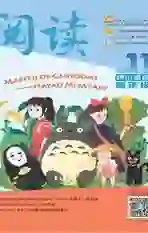树皮小屋里有“许多”故事
2020-12-28徐小红
徐小红
是葱绿的草丛泛黄的时候,
是落叶在地上翻滚的时候,
是秋雨和黄昏一同降临的时候,
女孩幸福地望着树皮小屋,
小屋里,蟋蟀在演奏,
小屋里,蚂蚱和萤火虫在舞蹈……
many 和much都表示“许多”。many修饰可数名词复数形式,much修饰不可数名词。如:
1. Do you have many good friends? 你有许多好朋友吗?
2. There isnt much juice in the bottle. 瓶子里没有多少果汁了。
3. My friends will come to the party. Many of them are good at dancing.
我的朋友们来参加聚会,其中很多人都擅长跳舞。
4. The pond is full of rain. Much is running into the river.
池塘里积满了雨水,大量的雨水正流向河里。
many和much可与how构成疑问词,对名词的数量进行提问。how many后接可数名词复数,how much后接不可数名词。如:
1. How many toys do you have? 你有多少玩具?
2. How much milk is there in the fridge? 冰箱里有多少牛奶?
a lot of和lots of既可跟可数名词复数形式,又可跟不可数名词。如:
1. There is a lot of water on the floor.
There is much water on the floor.
地板上有许多水。
2. We picked a lot of apples on the farm last week.
We picked many apples on the farm last week.
上周我们在农场里摘了许多苹果。
3. We played lots of games at the camp in the mountains.
We played many games at the camp in the mountains.
在山中野营地,我们做了许多游戏。
some和any 都表示“一些”,可修饰可数名词和不可数名词。some常用于肯定句,any则常用于疑问句和否定句中。如:
1. There is some time left. 还剩下些时间。
2. Some students are playing games in the playground.
一些学生正在操场上做游戏。
3. There isnt any water in the glass. 玻璃杯中没有水。
4. Can you see any pictures on the wall? 你能看到墙上的画吗?
some可用于表示请求的疑问句中,表示希望得到对方肯定回答。如:
1. Would you like some apple juice? 你想要喝些苹果汁吗?
2. - Can I have some writing paper, Mum? 妈妈,我能要一些信纸吗?
-Sure. Here you are. 当然可以,给你。
no用在肯定句中表示“没有”,相当于not any, not a/an。如:
1. There is no food on his plate.
There is not any food on his plate.
他的盘子里没有食物了。
2. There is no apple in the bag.
There is not an apple in the bag.
包里没有苹果。
还有一类词,通常叫做合成不定代词,它们都有some-, any-, no- 的词头,它们的用法和这三个词相同。如:
someone某人 somebody 某人 something 某事/物
anyone 任何人 anybody任何人 anything任何事/物
no one 没有人 nobody 没有人 nothing 没事/物
1. Somebody is waiting for you in the classroom.
有人在教室等你。
2. She didnt know anybody at the party.
晚会上,她谁也不认识。
3. No one knows his name.
没有人知道他的名字。
4. I have something important to tell you.
我有重要的事情要告訴你。
5. I cant do anything like that.
我不能做那样的事。
every和each都有“每个”的意思。every表示“各个”,强调整体概念,表示三者或三者以上,不与of搭配,动词一般用单数形式;each表示“每个”,强调个体概念,表示两者或两者以上,能与of搭配,动词一般也用单数形式。如:
1. Every student in our class studies hard. 我们班每个学生学习都很努力。
2. Every teacher in our school is kind. 我们学校每个老师都很好。
3. Each child has a toy. 每個孩子都有一个玩具。
4. Each lesson lasts forty minutes. 每堂课时间为40分钟。
5. My father gave a present to each of us. 爸爸给了我们每人一件礼物。
both和all都表示“全部都”。both表示“两者都”,而all表示“三者或三者以上都”。如:
1. Both of my parents are busy. 我的父母都很忙。
2. Ill buy both of them. 两个我都要买。
3. All of the students like English. 所有的学生都喜欢英语。
4. Tony, Mike and Tim are all good students. 托尼、迈克和提姆都是好学生。
5. All her money is in her purse. 她所有的钱都在钱包里。
all指事物的整体或抽象概念时用单数,指人时用复数。如:
1. All is going well. 一切进展顺利。(指事物的整体或抽象概念)
2. All are here, so lets start. 所有的人都到齐了,咱们开始吧。(指人)
a few和a little都有“少数、少量”的意思,带有肯定的意味。a few表示“几个”,后接可数名词复数形式;a little表示“一点”,后接不可数名词。如:
1. He asked me a few questions. 他问了我几个问题。
2. There are a few oranges on the table. 桌子上有几个橘子。
3. He only has a little money. 他仅有一点儿钱。
4. There is a little milk in the glass. 杯子里有一点儿牛奶。
5. There is only a little hope. 仅有一点儿希望。
few和little都有“很少,几乎没有”的意思,带有否定的意味。few后接可数名词复数形式,little后接不可数名词。如:
1. There are few apples in the basket. 篮子里没有几个苹果了。
2. There are few things I need to buy. 我不需要买什么东西。
3. We have little meat in the fridge. 冰箱里没有多少肉了。
4. There is little food left for us. 几乎没给我们留下什么食物。
5. I had little money and little free time. 我没什么钱,也没多少空闲时间。
听,那奇妙的音乐!
像树林里的鸟儿鸣唱,
像黄昏里的风铃叮当,
像田野上的长笛悠扬,
像宫殿里的铜钟回响……
哦,在树皮小屋里,
有多少美妙的故事……
